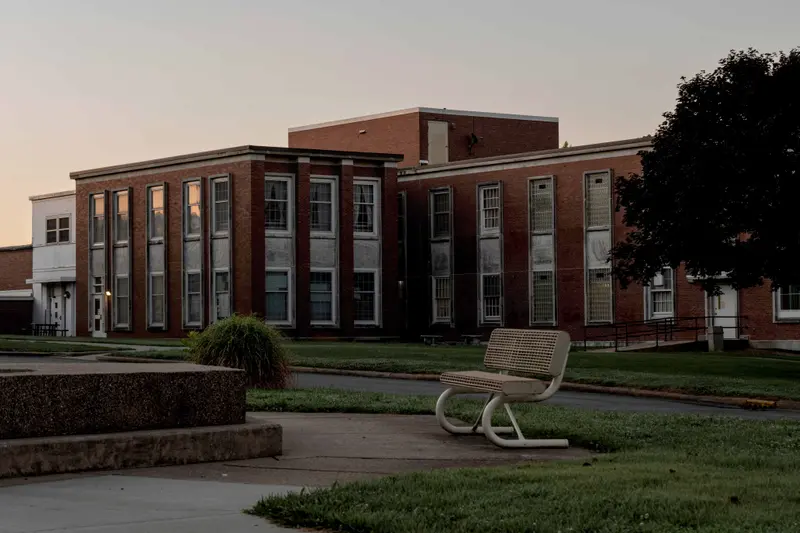This article was produced for ProPublica’s Local Reporting Network in partnership with Lee Enterprises, along with Capitol News Illinois. Sign up for Dispatches to get stories like this one as soon as they are published.
Update, March 9, 2023: This story has been updated to include community reaction after the plan to make changes was released.
The Illinois Department of Human Services plans to dramatically reduce the number of patients with developmental disabilities who live at the embattled state-run Choate Mental Health and Developmental Center.
In an exclusive interview before an expected Wednesday announcement, IDHS Secretary Grace Hou outlined a “repurposing and restructuring” of Choate, located in rural Anna, about 120 miles southeast of St. Louis. That process will start with the relocation of 123 residents with developmental disabilities who entered the facility voluntarily — roughly half the current population.
In a separate interview with reporters, Democratic Gov. J.B. Pritzker said that IDHS has been working on improvements at Choate since he first took office in January 2019. But he said “it became clear, I would say certainly over the last year — and, in part, because of your reporting — that there were more significant changes that needed to be made.”
The announcement — which the governor’s office billed as a “transformational” behavioral health initiative in southern Illinois — comes after months of reporting by Capitol News Illinois, Lee Enterprises and ProPublica that detailed the beatings of patients, a concerted effort by some staff members to cover up abuse and serious neglect, the intimidation of employees who reported it and the attempt to coerce new employees into participating in the abuse or being silent about it. Local prosecutors have filed felony charges against at least 49 people, both residents and employees, since 2015, a review of court records by reporters showed.
Hou also said the reporting played into the timing of the announcement because it has “brought a lot of this to light and I think forced the conversation into the public discourse.”
The agency will help residents relocate from Choate, and it will give them two to three years to move, Hou said. She said some will likely move into state-supported centers and others will go to community settings.
IDHS will also develop a plan for an additional 112 residents with developmental disabilities who currently live in its so-called specialty units, Hou said. The group includes some people who were sent to Choate by a criminal court judge after they were found unfit to stand trial or not guilty by reason of insanity. Hou said that the state is likely to move a “significant portion” of those residents, but that the agency does not want to rush the decision before it is able to determine “what capacity we have to serve those individuals in a different setting.”
In the interviews and news release, Hou, IDHS and the governor’s office did not label their plans for Choate as a closure, and no layoffs were included in the announcement. The facility’s 49-bed psychiatric hospital will remain open and may expand, Hou said. They’ve tapped the Southern Illinois University School of Medicine to determine the best path forward for the institution.
The restructuring of Choate, she said, is part of a broader goal for Illinois to expand services for people with developmental disabilities who are receiving state funding and want to live in the community; the aim is ultimately to reduce the number of people living at its seven developmental centers.
Advocacy and legal organizations that represent people with disabilities have long criticized the state for its heavy reliance on large public and private institutions to house people with disabilities, and for its lack of adequate funding for community-based options such as group homes or supports to keep people at home with loved ones.
Spurred by a slew of lawsuits across the country, states have reduced the number of people with developmental disabilities in state-operated institutions by more than 90% over the past half century, according to a 2022 study by the University of Minnesota. As of 2018, only four states — Illinois, Texas, North Carolina and New Jersey — had 1,000 or more state-operated beds open, the Minnesota study found.
Closures of large institutions accelerated with the U.S. Supreme Court’s 1999 Olmstead decision, which found it unconstitutional to segregate people with disabilities from the rest of society. Seventeen states no longer operate developmental centers at all, and others have dramatically reduced the number of beds they operate.
Illinois has shuttered some of its large institutions over the past two decades, but it has been slow to transition compared with other states. It houses more people with developmental disabilities in large institutions and spends more to operate those institutions relative to statewide personal income than almost every other state in the nation, according to a review of data compiled by researchers with the University of Kansas. The number of people, nearly 15,000, on its waitlist for community-based services for people with intellectual and developmental disabilities is one of the largest in the country.
In addition, a 2005 lawsuit brought on behalf of residents living in large privately operated state-funded centers argued the state had failed to live up to the mandates of Olmstead. As a result, Illinois currently operates under the terms of a federal consent decree to ensure that people with developmental disabilities get sufficient support from the state in their homes and community settings.
Hou said this week that when Pritzker appointed her to lead IDHS after he took office in 2019, the state’s poor record was common knowledge. “I think all of us leaders knew that Illinois was a laggard as it relates to prioritizing community-based care,” she said.
But Hou said that back then, the provider network that serves people in the community was not in a place to handle a large influx of people. Then COVID-19 hit the following year, putting significant changes on hold. “We’ve taken the opportunity over the course of the past four years to build up the community-based system,” she said, including increasing pay for direct service professionals, the front-line caretakers.
Hou said the state has made significant new investments in its community-based system since Pritzker took office, but it has so far failed to make the improvements needed to bring the consent decree to a close.
Pritzker, who just won a second term, has faced numerous challenges with the large state agencies that provide social and human services. Advocates for people with disabilities have praised the administration’s expansion of services, but they argued it hasn’t been enough to correct decades-old problems. Pritzker said the budget crisis under his predecessor “hollowed out” social service agencies; the pandemic further caused a labor shortage, he said.
“Rebuilding takes time, and we’re proud of the progress that we’ve made so far,” he said.
The plan Hou put forth also signaled changes for all state-operated developmental centers, including safety enhancements, and expanding support for community-based living.
The agency also created a new position of chief resident safety officer to oversee security at all residential centers. Ryan Thomas, a former compliance officer for a Chicago community health organization, will fill that role. In addition, the agency announced it would be adding 10 investigators to its Office of Inspector General, which investigates allegations of patient maltreatment.

This week’s decision to repurpose Choate “advances the State’s commitment to equity and the civil rights of people with disabilities,” IDHS said in its news release about its planned announcement. “It also reflects the State’s legal duty to ensure residents with disabilities have a full opportunity to live in the least restrictive environment of their choosing.”
In its news release, IDHS noted that Choate had been heavily scrutinized by state and federal overseers, as well as Equip for Equality, a legal advocacy organization appointed to monitor conditions inside Choate, for at least the past 20 years.
In a 2005 report, Equip for Equality detailed cases of patient abuse and neglect, poor medical and mental health care and an excessive use of restraints; it said that an “archaic system” had resulted in “tragic consequences for people with disabilities.” A U.S. Justice Department investigation had similar findings in a report four years later. At the time, IDHS promised to improve conditions, but the news organizations’ reporting uncovered that strikingly similar patient mistreatment and poor care persisted long after the Justice Department closed its case in 2013.
Past governors have closed facilities, but Illinois has a poor record when it comes to ensuring that the community-based system has the proper oversight and staffing to provide safe care for those who move. In 2011, then-Gov. Pat Quinn, a Democrat, announced plans to close several state-operated facilities under a plan he called a “rebalancing initiative.” Those included Jacksonville Developmental Center, about 35 miles southwest of the capital, Springfield, and the Warren G. Murray Developmental Center in the southern Illinois city of Centralia.
Some residents moved out of Murray, but ultimately it was not closed after parents, the union and local leaders opposed the plan and Quinn lost his reelection bid. Jacksonville was. Four years later, a Chicago Tribune investigation documented the state’s botched transition efforts, resulting in horrifying mistreatment and tragic deaths across the state.
Hou, in the interview, acknowledged the difficulty of closing facilities. “The one thing that is common throughout those closures is that it tears communities apart. And it pits people against each other,” she said, adding that it was her hope to avoid past mistakes.
Hou also said there would be no change in the administration at Choate. Bryant Davis, the facility manager, and Gary Goins, the quality manager, were both indicted by a Union County grand jury in 2021 on charges of felony official misconduct in connection with a patient abuse case. After the charges were issued, they were relieved of their duties at the facility. They pleaded not guilty, the charges were later dismissed and they returned to work.
“We’ve weighed a lot of different perspectives, but I think we need a leader who knows Choate inside and out, who has relationships with the residents and the parents and the staff to lead us through this challenging transition. I think to put someone new in there, I think would be very disruptive and even further unsettling,” Hou said.
After the announcement, families of Choate patients expressed concern that residents were being pushed out of stable homes, potentially to other placements far away in the state. And union leaders representing Choate employees expressed alarm at potential job losses.
Terri Bryant, a Republican from Murphysboro whose district neighbors Choate, called the plan shortsighted and said it lacked concrete details. In a call with reporters on Wednesday, she accused the governor of taking the “lazy-man’s route” to fixing safety and workforce issues raised in news reports. Other legislators took a more wait-and-see approach.
During a news conference on the day of the announcement, Pritzker told reporters that IDHS was making reforms to ensure patient safety, but “this is something that you can’t snap your fingers and fix.”






